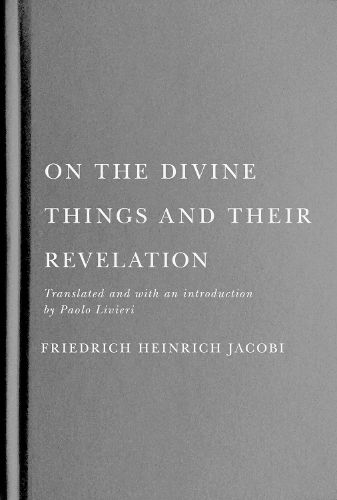Readings Newsletter
Become a Readings Member to make your shopping experience even easier.
Sign in or sign up for free!
You’re not far away from qualifying for FREE standard shipping within Australia
You’ve qualified for FREE standard shipping within Australia
The cart is loading…






Friedrich Heinrich Jacobi (1743-1829) both introduced and epitomized the great philosophical controversies of his age. His influential text Von den goettlichen Dingen und Ihrer Offenbarung aroused the final debate about the intrinsic nihilism of modern philosophy, which, he postulated, ran the risk of becoming a serious threat to human life and intellect.
In the first English translation of this text,* On the Divine Things and Their Revelation*, Paolo Livieri provides readers with a historical investigation of the debates that preceded and followed Jacobi's book, as well as a philosophical review of its main topics and arguments. Jacobi's concluding analysis against systematic philosophy, given at the closing of the era of German idealism, offers an overview of the possibility of connecting the human and the divine according to the metaphysical approach that he develops into theism. This philosophical testament revives the divisive ideas of his first publications and provides new insights into his critique of Baruch Spinoza's philosophy, yielding a final evaluation of Immanuel Kant's transcendental method.
Bringing together Jacobi's most famous themes - from faith to revelation and nihilism to immediate knowledge - On the Divine Things and Their Revelation expresses his tireless commitment to situating the human being at the centre of reality.
$9.00 standard shipping within Australia
FREE standard shipping within Australia for orders over $100.00
Express & International shipping calculated at checkout
Friedrich Heinrich Jacobi (1743-1829) both introduced and epitomized the great philosophical controversies of his age. His influential text Von den goettlichen Dingen und Ihrer Offenbarung aroused the final debate about the intrinsic nihilism of modern philosophy, which, he postulated, ran the risk of becoming a serious threat to human life and intellect.
In the first English translation of this text,* On the Divine Things and Their Revelation*, Paolo Livieri provides readers with a historical investigation of the debates that preceded and followed Jacobi's book, as well as a philosophical review of its main topics and arguments. Jacobi's concluding analysis against systematic philosophy, given at the closing of the era of German idealism, offers an overview of the possibility of connecting the human and the divine according to the metaphysical approach that he develops into theism. This philosophical testament revives the divisive ideas of his first publications and provides new insights into his critique of Baruch Spinoza's philosophy, yielding a final evaluation of Immanuel Kant's transcendental method.
Bringing together Jacobi's most famous themes - from faith to revelation and nihilism to immediate knowledge - On the Divine Things and Their Revelation expresses his tireless commitment to situating the human being at the centre of reality.